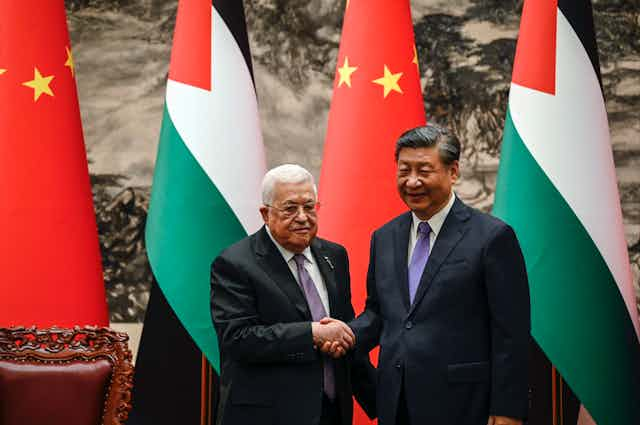The western world’s support for Israel as it attacks Gaza has provoked fury across the Arab world and much of the Global South.
This situation undermines the West’s international standing and offers opportunities for China to enhance its regional and global diplomatic influence. Whether and how it will seize them remains to be seen.
Led by the United States, the West has presented itself as following a “rules-based liberal international order” that ostensibly protects human rights and international norms.
On this basis, the West has opposed Russia’s invasion and occupation of Ukraine. However, it isn’t applying these rules to Israel and Palestinians.
U.S. Secretary of State Antony Blinken said the U.S. supports a humanitarian pause but not a ceasefire. The White House says Israel has now agreed to four-hour daily pauses in military operations in Gaza.
Children’s ‘graveyard’
Most western governments have thrown their support behind Israel as it launches a devastating attack on Gaza. In response to Hamas’s brutal attack and hostage-takings on Oct. 7, Israel has bombed schools, hospitals, ambulances, refugee camps, bakeries, mosques, churches, flattened neighbourhoods and killed thousands of people, possibly 40 per cent of them children.
UN Secretary General António Guterres has said “Gaza is becoming a graveyard for children.” About 1,300 children are believed buried under rubble. Hospitals are collapsing. The perception in the Global South is that Palestinian lives are virtually worthless to the West.

Some western governments’ efforts to censor and criminalize public demonstrations supporting Palestinians adds another perceived dimension of hypocrisy to the West’s actions.
Even mild statements of support for Palestinians can be enough to endanger peoples’ careers, especially in the U.S.
Read more: The West's double standards are once again on display in Israel and Palestine
A boon to China?
In this environment, the war in Gaza provides China with diplomatic and political opportunities.
From the Chinese perspective, one political benefit is that the U.S. has lost any credibility in its criticism of China’s treatment of the Uyghur people.
The U.S. argues that Israel has the right to protect itself from terrorism. China has claimed the same right in its oppression of the Uyghurs of Xinjiang.
China’s actions against the Uyghurs are certainly disturbing, but they aren’t as devastating as what Israel is doing to Palestinians. And unlike Israel’s illegal occupation of Palestine, Xinjiang is China’s sovereign territory.

China also has a strong interest in promoting peace in the Middle East given about half of its imported oil comes from the region. China helped Saudi Arabia and Iran normalize their relations.
Four Middle Eastern countries have joined BRICS, the international forum representing the world’s rising powers founded by Brazil, Russia, India, China and South Africa. Saudi Arabia is also considering selling China oil in its own currency, the yuan.
Bypassing Palestinians
Ongoing American efforts under President Joe Biden to normalize relations between Saudi Arabia and Israel were partly motivated by fear of China’s diplomatic and economic progress in the Middle East.
Some have argued this American attempt to bypass the Palestinians may have played a role in Hamas’s attack on Israel. The U.S. has fomented conflict in the Middle East to keep the Islamic world divided and empower Israel, in contrast to China’s imperative for regional stability.
The U.S. has promoted the India-Middle East-Europe Economic Corridor to enhance its presence in the Middle East, more fully integrate Israel into the regional economy and counteract China’s growing regional influence.
But Arab states don’t share the American desire to contain China. They prefer a multi-polar world where they can leverage several larger powers against each other and increase their own global geopolitical influence.
The longer Israel’s assault on Gaza continues, the higher the civilian death toll climbs and the more politically difficult it will be for the Arab world to co-operate with Israel or the U.S. That will push the Gulf states even closer to China.
In the current Gaza conflict, China has emphasized the need to avoid civilian casualties while rejecting Israel’s demand that it specifically condemn Hamas. China’s position reflects the consensus of the Global South, which considers the recent historical context of the conflict and Israel’s occupation of Palestine.

Americans distracted
The Israel-Gaza war is also distracting the U.S. from the Indo-Pacific region, further working to China’s advantage.
The U.S. is mired in the Middle East. Biden’s administration supports the two-state solution to the conflict, but that solution may no longer be viable.
The U.S. appears unprepared to use its leverage over Israel to force it to accept a two-state solution. Any Israeli government that tried to move huge numbers of illegal settlers out of their settlements would face massive domestic criticism, even a potential civil war.

China’s diplomatic successes in the Middle East have involved reconciling states that were already inching towards restoring relations. Nonetheless, China could position itself as the superpower that champions the interests of the Arab world and the perspective of the Global South in future negotiations.
China will therefore likely be much more even-handed in its approach to the conflict than the U.S.
Is China willing to play a more active role in the Israel-Palestine dispute? It may be tempted to let the U.S. stew in a problem of its own making, but regional peace and stability benefits China’s economic development.
Read more: Biden in Israel: How U.S. foreign policy has played a big role in the Israel-Hamas war
While some scholars are skeptical of China’s potential role in any ceasefire or peace negotiations, the Chinese have more credibility in the region than the Americans do.
The U.S. has mismanaged and damaged the Middle East for decades. It would benefit the region if a superpower more inclined towards diplomacy than violence played a balancing role.

